|
|
|
Sort Order |
|
|
|
Items / Page
|
|
|
|
|
|
|
| Srl | Item |
| 1 |
ID:
108951
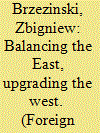

|
|
|
| 2 |
ID:
023825
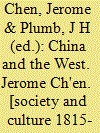

|
|
|
|
|
| Publication |
London, Hutchinson and Company, 1979.
|
| Description |
488p.
|
| Standard Number |
0091382106
|
|
|
|
|
|
|
|
|
|
|
|
Copies: C:1/I:0,R:0,Q:0
Circulation
| Accession# | Call# | Current Location | Status | Policy | Location |
| 018836 | 327.51073/CHE 018836 | Main | On Shelf | General | |
|
|
|
|
| 3 |
ID:
095094
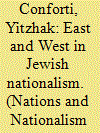

|
|
|
|
|
| Publication |
2010.
|
| Summary/Abstract |
This article analyses the ethnic and civic components of the early Zionist movement. The debate over whether Zionism was an Eastern-ethnic nationalist movement or a Western-civic movement began with the birth of Zionism. The article also investigates the conflict that broke out in 1902 surrounding the publication of Herzl's utopian vision, Altneuland. Ahad Ha'am, a leader of Hibbat Zion and 'Eastern' cultural Zionism, sharply attacked Herzl's 'Western' political Zionism, which he considered to be disconnected from the cultural foundations of historical Judaism. Instead, Ahad Ha'am supported the Eastern Zionist utopia of Elchanan Leib Lewinsky. Hans Kohn, a leading researcher of nationalism, distinguished between 'Eastern' and 'Western' nationalist movements. He argued that Herzl's political heritage led the Zionist movement to become an Eastern-ethnic nationalist movement. The debate over the character of Jewish nationalism - ethnic or civic - continues to engage researchers and remains a topic of public debate in Israel even today. As this article demonstrates, the debate between 'Eastern' and 'Western' Zionism has its foundations in the origins of the Zionist movement. A close look at the vision held by both groups challenges Kohn's dichotomy as well as his understanding of the Zionist movement.
|
|
|
|
|
|
|
|
|
|
|
|
|
|
|
|
| 4 |
ID:
154477
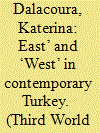

|
|
|
|
|
| Summary/Abstract |
The tired old civilisational categories of ‘East’ and ‘West’, loosely identified with ‘Islam’ and ‘modernity’, are alive and well, nowhere more so than in contemporary Turkey. The Justice Development Party (AKP) currently in government employs them assiduously to political advantage but they have a long history, having defined the parameters of societal identity and political discourse throughout the history of the Turkish Republic. The paper takes the strength of the categories as its starting point but moves beyond them by asking if discourses, narratives and identities, individual and collective, exist in Turkey which question, overcome and ultimately undermine the categories of ‘East’ and ‘West’. The paper starts by investigating the evolution of ideas about East and West since the late Ottoman period and accepts that they are still dominant. However, since the 1980s in particular, they are being undermined in a de facto way by cultural developments in literature and music, new trends in historiography and novel ways of relating to the past. In some ways in contemporary Turkey, the paper concludes, culture trumps the inherently essentialist idea of ‘civilisation’ and Turkish society is ahead of its political and intellectual elites.
|
|
|
|
|
|
|
|
|
|
|
|
|
|
|
|
| 5 |
ID:
104999
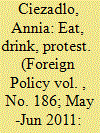

|
|
|
|
|
| Publication |
2011.
|
| Summary/Abstract |
There are many ways to celebrate a military victory -- you can sack a city, purge your opponents, or put on a flight suit and strut around an aircraft carrier. In August 2006, I was in Lebanon, where bridges, highways, and entire neighborhoods had been smashed to rubble in the war between Israel and the Iran-backed Shiite militia Hezbollah. Just after the cease-fire, I got an email from a friend in Tehran: Iranian President Mahmoud Ahmadinejad had celebrated the "divine victory" over Israel by treating his subjects to what he claimed was the world's largest grilled kebab. The "victory kebab" was 21 long feet of juicy, meaty celebration -- a display of raw carnal politics that would have made a 19th-century New York Tammany ward boss proud.
|
|
|
|
|
|
|
|
|
|
|
|
|
|
|
|
| 6 |
ID:
084315
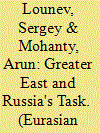

|
|
|
| 7 |
ID:
099927
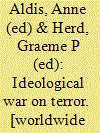

|
|
|
|
|
| Publication |
London, Routledge, 2007.
|
| Description |
xviii, 285p.
|
| Standard Number |
9780415400732, hbk
|
|
|
|
|
|
|
|
|
|
|
|
Copies: C:1/I:0,R:0,Q:0
Circulation
| Accession# | Call# | Current Location | Status | Policy | Location |
| 055449 | 363.32516/ALD 055449 | Main | On Shelf | General | |
|
|
|
|
| 8 |
ID:
164207
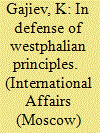

|
|
|
|
|
| Summary/Abstract |
SWEEPING CHANGES of epochal dimensions are caused by the deep-cutting shifts in the most important spheres of social life at the national, regional and global levels, protracted social and economic crises, wars, disintegration of the old and emergence of new ambitious powers, etc. These shifts marked essential stages in the development of international political systems; they were responsible for the disintegration of great civilizations, empires, world powers, and the corresponding world orders. In October 1648, the Westphalian system, the product of the Peace of Westphalia, ended the Thirty Years' War in Europe and buried Roman Catholic universalism and the Holy Roman Empire. The balance of power, the system formulated by the Vienna Congress of 1815, that rested on Westphalian principles was built up on the ruins of Napoleon's empire. The Versailles-Washington system is the product of World War I that destroyed the Austro-Hungarian and Ottoman empires and detached big chunks from the territory of the Russian Empire. The bipolar world was one of the results of the rout of the Third Reich and the Land of the Rising Sun in World War II. In the final analysis, this war delivered a fatal strike to the great colonial empires of Great Britain, France, the Netherlands, and Portugal. Here I will try to identify and analyze systemic and structural components of the so-called liberal or unipolar world order that replaced the bipolar world order when the Cold War had ended and the Soviet Union with its history of triumphs and failures had disintegrated.
|
|
|
|
|
|
|
|
|
|
|
|
|
|
|
|
| 9 |
ID:
193350
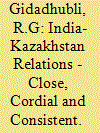

|
|
|
|
|
| Summary/Abstract |
Kazakhstan is the largest country in the Central Asian region, and ninth largest country in the world. Kazakhstan is strategically located with China on the east and Russia on the north. An effort has been made to elaborate relations between India and Kazakhstan.
|
|
|
|
|
|
|
|
|
|
|
|
|
|
|
|
| 10 |
ID:
169607
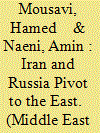

|
|
|
|
|
| Summary/Abstract |
Iran and Russia are cooperating on the construction of the Bushehr nuclear power plant as well as others. Iran is a major importer of Russian arms, including the S‐300 missile system. Efforts to keep Bashar al‐Assad in power in Syria have led to unprecedented military and intelligence cooperation between the two countries. They were also recently able to reach an agreement on rights to the Caspian Sea after many years of strife. Moreover, trade between the two has increased in the wake of Western sanctions. Russia has become disillusioned about better relations with the West following unsuccessful attempts to improve them during the tenure of Dmitry Medvedev. Iran is coming to a similar realization with the collapse of the nuclear deal (JCPOA). The two countries also share the goal of limiting U.S. global influence.
|
|
|
|
|
|
|
|
|
|
|
|
|
|
|
|
| 11 |
ID:
096830
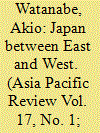

|
|
|
| 12 |
ID:
156977
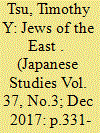

|
|
|
|
|
| Summary/Abstract |
From the late nineteenth century until the end of the Pacific War, Japanese expansionist discourse urging the country to take on an ever greater role in Southeast Asia had a great impact on how Japanese people imagined their destiny as a nation. That this discourse took Western colonial powers in the region as presumed adversaries is well known, but the fact that it also posited the Chinese diaspora there as a main competitor has received little scholarly attention. This article analyses the growing concern of Japanese southward expansionism since the end of the nineteenth century over Chinese migrants in Southeast Asia. It addresses a gap in existing research on pre-war and wartime Japanese geopolitical and racialist thinking on Southeast Asia. It also presents a wider view on Japanese treatment (or mistreatment) of Chinese in occupied Southeast Asia during World War Two.
|
|
|
|
|
|
|
|
|
|
|
|
|
|
|
|
| 13 |
ID:
099501
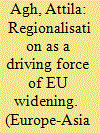

|
|
|
|
|
| Publication |
2010.
|
| Summary/Abstract |
This article focuses on the 'globalisation-cum-regionalisation' process in the European Union that has led to the emergence of functional macro-regions. It provides first a classification of regionalisation, and describes the organisational and mental barriers of the European Neighbourhood Policy (ENP). The second part traces the shift of the ENP from the South to the East that has also activated the EU's pre-accession policy in the West Balkan region and the Eastern Partnership programme. Finally, it argues that the Baltic Strategy and the Danube Strategy as functional macro-regions are the main instruments to overcome the weaknesses of the incentive-based approach in the EU's conditionality (or, as it is described here, its 'carrot crisis').
|
|
|
|
|
|
|
|
|
|
|
|
|
|
|
|
| 14 |
ID:
106113
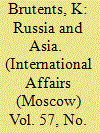

|
|
|
| 15 |
ID:
191029
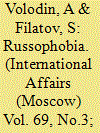

|
|
|
|
|
| Summary/Abstract |
FROM an analytical perspective, Russophobia is not all that different from other social phenomena. Like other forms of xenophobia, Russophobia operates on two levels: public fears and state policies. The boundaries between these two levels are often relative, fluid, and subject to change.
The authors suggest that Russophobia is a significant yet specific form of xenophobia, which represents a rejection of something foreign, unfamiliar, and therefore potentially dangerous to the established way of life in a given society. This perceived threat may be viewed as endangering the very existence of the established order of things. As historical experience has shown, xenophobia can arise from a sense of inferiority (either genetically inherited or acquired), stem from a "failed great power" complex that places the blame on a disliked neighboring state (or a perennial geopolitical rival), or emerge from the constant fear of the territorial size and military potential of the "demonized" power, etc...
|
|
|
|
|
|
|
|
|
|
|
|
|
|
|
|
| 16 |
ID:
087833
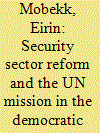

|
|
|
|
|
| Publication |
2009.
|
| Summary/Abstract |
The Democratic Republic of Congo has been plagued by continued conflict and violence in the East despite the official ending of the war. And civilians have borne the brunt of this conflict. Security sector reform (SSR) is a critical element in ensuring security, stability and sustainable peace. This article examines security sector reform conducted by the UN Mission in Congo, and also refers to other actors involved in the process, focusing primarily on the East where insecurity is prevalent due to the non-integrated Congolese forces, the Armed Forces of the DRC, other armed groups and foreign, mainly Rwandan, troops. It contends that SSR is vital to protect civilians and that thus far MONUC has not fulfilled its mandate of protection
|
|
|
|
|
|
|
|
|
|
|
|
|
|
|
|
|
|
|
|
|